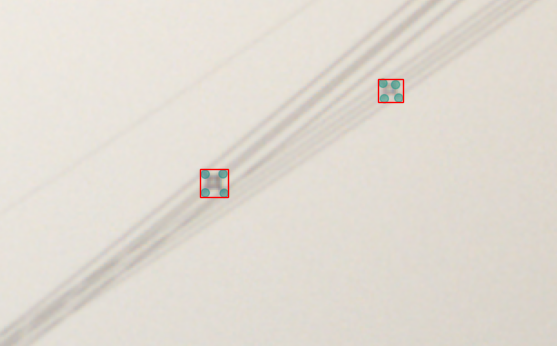之前用detectron2 的keypoint_rcnn训练自己的数据集完成物体特征点检测,这篇文章是将pytorch模型转为c++调用的形式。
实现效果:

Detectron2 提供了将pytorch模型转为c++调用的例程:Deployment,gpu版本的模型转换需要pytorch版本>=1.5.0,ONNX 版本 >= 1.6。跟着官方的demo转换就行。
- pytorch的安装命令如下:
# conda切换清华源,速度快很多
vim ~/.condarc
channels:
- defaults
show_channel_urls: true
channel_alias: https://mirrors.tuna.tsinghua.edu.cn/anaconda
default_channels:
- https://mirrors.tuna.tsinghua.edu.cn/anaconda/pkgs/main
- https://mirrors.tuna.tsinghua.edu.cn/anaconda/pkgs/free
- https://mirrors.tuna.tsinghua.edu.cn/anaconda/pkgs/r
- https://mirrors.tuna.tsinghua.edu.cn/anaconda/pkgs/pro
- https://mirrors.tuna.tsinghua.edu.cn/anaconda/pkgs/msys2
- https://mirrors.tuna.tsinghua.edu.cn/anaconda/cloud/pytorch
conda clean -i
# 创建conda环境
conda create -n detectron2-pytorch1.5 python=3.7
source activate detectron2-pytorch1.5
conda install pytorch=1.5.0 torchvision cudatoolkit=10.1 -c pytorch
# 若速度还是慢,把 “-c pytorch” 去掉
conda install protobuf numpy
pip install onnx
./caffe2_converter.py --config-file ../configs/COCO-Keypoints/keypoint_rcnn_R_50_FPN_1x.yaml --output ./caffe2_model_gpu MODEL.WEIGHTS ../output/model_final.pth MODEL.DEVICE cuda
cmake -DCMAKE_PREFIX_PATH=/home/jiajie/pytorch/libtorch ..
make
./build/caffe2_mask_rcnn --predict_net=./model.pb --init_net=./model_init.pb --input=crop_imglab_45.png
caffe2_mask_rcnn.cpp的代码如下,较官方的demo只是添加了我需要的特征点输出部分:
// Copyright (c) Facebook, Inc. and its affiliates. All Rights Reserved
#include <c10/util/Flags.h>
#include <caffe2/core/blob.h>
#include <caffe2/core/common.h>
#include <caffe2/core/init.h>
#include <caffe2/core/net.h>
#include <caffe2/core/workspace.h>
#include <caffe2/core/context_gpu.h>
#include <caffe2/utils/proto_utils.h>
#include <opencv2/opencv.hpp>
#include <cassert>
#include <chrono>
#include <iostream>
#include <string>
#include <math.h>
C10_DEFINE_string(predict_net, "", "path to model.pb");
C10_DEFINE_string(init_net, "", "path to model_init.pb");
C10_DEFINE_string(input, "", "path to input image");
using namespace std;
using namespace caffe2;
int main(int argc, char** argv) {
caffe2::GlobalInit(&argc, &argv);
string predictNetPath = FLAGS_predict_net;
string initNetPath = FLAGS_init_net;
cv::Mat input = cv::imread(FLAGS_input, cv::IMREAD_COLOR);
const int height = input.rows;
const int width = input.cols;
// FPN models require divisibility of 32
assert(height % 32 == 0 && width % 32 == 0);
const int batch = 1;
const int channels = 3;
// initialize Net and Workspace
caffe2::NetDef initNet_, predictNet_;
CAFFE_ENFORCE(ReadProtoFromFile(initNetPath, &initNet_));
CAFFE_ENFORCE(ReadProtoFromFile(predictNetPath, &predictNet_));
Workspace workSpace;
for (auto& str : predictNet_.external_input()) {
workSpace.CreateBlob(str);
}
for (auto& str : predictNet_.external_output()) {
cout<<"name is: "<<str<<endl;
}
CAFFE_ENFORCE(workSpace.CreateNet(predictNet_));
CAFFE_ENFORCE(workSpace.RunNetOnce(initNet_));
// setup inputs
auto data = BlobGetMutableTensor(workSpace.GetBlob("data"), caffe2::CPU);
data->Resize(batch, channels, height, width);
float* ptr = data->mutable_data<float>();
// HWC to CHW
for (int c = 0; c < 3; ++c) {
for (int i = 0; i < height * width; ++i) {
ptr[c * height * width + i] = static_cast<float>(input.data[3 * i + c]);
}
}
auto im_info =
BlobGetMutableTensor(workSpace.GetBlob("im_info"), caffe2::CPU);
im_info->Resize(batch, 3);
float* im_info_ptr = im_info->mutable_data<float>();
im_info_ptr[0] = height;
im_info_ptr[1] = width;
im_info_ptr[2] = 1.0;
// run the network
CAFFE_ENFORCE(workSpace.RunNet(predictNet_.name()));
// run 3 more times to benchmark
int N_benchmark = 3;
auto start_time = chrono::high_resolution_clock::now();
for (int i = 0; i < N_benchmark; ++i) {
CAFFE_ENFORCE(workSpace.RunNet(predictNet_.name()));
}
auto end_time = chrono::high_resolution_clock::now();
auto ms = std::chrono::duration_cast<std::chrono::microseconds>(
end_time - start_time)
.count();
cout << "Latency: " << ms * 1.0 / 1e6 / N_benchmark << " seconds" << endl;
// parse Mask R-CNN outputs
/*
auto& bbox = BlobGetTensor(*workSpace.GetBlob("bbox_nms"), caffe2::CPU);
auto& scores = BlobGetTensor(*workSpace.GetBlob("score_nms"), caffe2::CPU);
auto& labels = BlobGetTensor(*workSpace.GetBlob("class_nms"), caffe2::CPU);
auto& kps_score = BlobGetTensor(*workSpace.GetBlob("kps_score"), caffe2::CPU);
*/
caffe2::Tensor bbox(
workSpace.GetBlob("bbox_nms")->Get<caffe2::Tensor>(), caffe2::CPU);
caffe2::Tensor scores(
workSpace.GetBlob("score_nms")->Get<caffe2::Tensor>(), caffe2::CPU);
caffe2::Tensor labels(
workSpace.GetBlob("class_nms")->Get<caffe2::Tensor>(), caffe2::CPU);
caffe2::Tensor kps_score(
workSpace.GetBlob("kps_score")->Get<caffe2::Tensor>(), caffe2::CPU);
cout << "bbox:" << bbox.DebugString() << endl;
cout << "scores:" << scores.DebugString() << endl;
cout << "labels:" << labels.DebugString() << endl;
//(#ROIs, #keypoints, POOL_H, POOL_W)
cout << "kps_score: " << kps_score.DebugString() << endl;
//vector<float> kps_vec;
//const float* kps = kps_score.data<float>() + 0 * kps_score.size_from_dim(1);
//const float* kps_1 = kps + 0 * kps_score.size_from_dim(2);
//cout <<"the size is: "<< kps_score.size_from_dim(0) << endl;
int num_instances = bbox.sizes()[0];
for (int i = 0; i < num_instances; ++i) {
float score = scores.data<float>()[i];
if (score < 0.9)
continue; // skip them
const float* box = bbox.data<float>() + i * 4;
int label = labels.data<float>()[i];
cout << "Prediction " << i << ", xyxy=(";
cout << box[0] << ", " << box[1] << ", " << box[2] << ", " << box[3]
<< "); score=" << score << "; label=" << label << endl;
// 从heatmaps中提取特征点.
const float* kps = kps_score.data<float>() + i * kps_score.size_from_dim(1);
float bbx_offset_x = box[0];
float bbx_offset_y = box[1];
float bbx_width = (box[2]-box[0])>0?(box[2]-box[0]):1;
float bbx_heights = (box[3]-box[1])>0?(box[3]-box[1]):1;
int widths_ceil = ceil(bbx_width);
int heights_ceil = ceil(bbx_heights);
//cout<<"widths_ceil size: "<<widths_ceil<<endl;
//cout<<"heights_ceil size: "<<heights_ceil<<endl;
int num_keypoints = kps_score.size_from_dim(1)/kps_score.size_from_dim(2);
//cout << "num_keypoints: " << num_keypoints << endl;
float xy_preds[num_keypoints*2] = {0};
float width_corrections = bbx_width / widths_ceil;
float height_corrections = bbx_heights / heights_ceil;
cv::Size dsize = cv::Size(widths_ceil,heights_ceil);
//双线性插值
for(int n = 0;n<num_keypoints;++n)
{
cv::Mat src_map = cv::Mat::zeros(56,56,CV_32FC1);
cv::Mat resize_roi_map = cv::Mat::zeros(dsize,CV_32FC1);
//cout<<"intput size: "<<src_map.cols<<" , "<<src_map.rows<<endl;
//cout<<"output size: "<<resize_roi_map.cols<<" , "<<resize_roi_map.rows<<endl;
for(int j = 0;j<src_map.rows;++j)
{
for(int k = 0;k<src_map.cols;++k)
{
*((float*)(src_map.data+j*src_map.step[0]+k*src_map.step[1])) = kps[n*56*56+j*src_map.cols+k];
}
}
/*
double maxVal1 = 0;
cv::Point maxLoc1;
cv::minMaxLoc(src_map, NULL, &maxVal1, NULL, &maxLoc1);
cout << "最大值: " << maxVal1 << endl;
cout << "最大值位置: " << maxLoc1 << endl;
*/
cv::resize(src_map, resize_roi_map, dsize, 0, 0);
//默认双线性插值
cout<<"output data size :"<<resize_roi_map.size()<<endl;
double maxVal = 0;
cv::Point maxLoc;
cv::minMaxLoc(resize_roi_map, NULL, &maxVal, NULL, &maxLoc);
//cout << "插值最大值: " << maxVal << endl;
//cout << "插值最大值位置: " << maxLoc << endl;
float x_int = float(maxLoc.x);
int y_int = maxLoc.y;
//尽量减小舍入误差
float x = (float(maxLoc.x) + 0.5) * width_corrections;
float y = (float(maxLoc.y) + 0.5) * height_corrections;
cout<<"x: "<<x<<" y: "<<y<<endl;
xy_preds[n*2] = bbx_offset_x + x ;
xy_preds[n*2 + 1] = bbx_offset_y + y ;
}
for(int i = 0;i<num_keypoints;++i)
{
cout<<"pred_x: "<<xy_preds[i*2+0]<<" pred_y: "<<xy_preds[i*2+1]<<endl;
}
}
return 0;
}
由于转换后的网络输出只是原始输出格式,想要得到特征点在图像中的位置还需要一定的后处理,原始输出是:
caffe2::Tensor kps_score(
workSpace.GetBlob("kps_score")->Get<caffe2::Tensor>(), caffe2::CPU);
输出的kps_score是 numInstance * numKeypoint * heatMap_width * heatMap_height 的数组格式,对于每一个keypoint,网络会输出一个(56 * 56)的heatMap,首先将heapMap通过双线性插值resize到和对应的bbox一样的大小,把它记为heapMap_resize,其中heapMap_resize中最大值元素所在位置即为keypoint的local_position,再加上对应的bbox左上角的偏移量即为keypoint在图像中的坐标了。